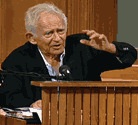Comment on this article
More Change in Yale’s Top Ranks
November/December 2004
by Jennifer Kaylin
For the third time in two years, a top Yale administrator has been chosen to lead another elite university. In August, provost Susan Hockfield was named president of the Massachusetts Institute of Technology, making her the first woman and the first life sciences professor to head the traditionally male-dominated, engineering-oriented university. She is succeeded by Deputy Provost for Science and Technology Andrew Hamilton, who took over as Yale’s second-highest-ranking official in October.
Hockfield held the job for less than two years, succeeding Alison Richard in January 2003 after Richard left Yale to head the University of Cambridge as its vice-chancellor. Her predecessor at Yale, Judith Rodin, left in 1994 for the presidency of the University of Pennsylvania. Last summer, Yale College dean Richard Brodhead '68, '72PhD, left to become president of Duke University.
Hamilton, a former chair of the chemistry department, was appointed deputy provost just last year. “Up until now, I’ve been largely focused on science, so I see this as a chance to become more deeply involved in the broader mission of the university,” he says, adding that hiring more female and minority professors will be a major priority. “The faculty should reflect the diversity of society.”
At a reception following the announcement of Hamilton’s appointment, Levin called the new chief academic and financial officer “articulate, keen, and incisive” and noted the widespread praise he’s received for identifying problems and moving swiftly to solve them.
Chemistry department chair Gary Brudvig calls Hamilton “a multi-talented guy who sees the essence of a problem and cuts to the chase.” As an example, Brudvig cited Hamilton’s efforts to expedite the construction of a new chemistry building. “The effort was ongoing for about ten years,” Brudvig says. “A lot of convincing was needed as to how and where it should be built. One of Andy’s successes while chairman of the department was that he made it happen.” The building is under construction and will be completed next year.
Hamilton, who received his PhD from the University of Cambridge, taught at the University of Pittsburgh and Princeton University before joining the Yale faculty in 1997. His work in organic chemistry includes new insights into drug design and the development of possible cancer therapies. He has also worked on a team that turned super-critical carbon dioxide into gel form, resulting in an environmentally friendly solvent for oil recovery and other uses. A native of the United Kingdom, he was recently elected a Fellow of the Royal Society.
As Hockfield prepares to take office at MIT in December, her colleagues laud her skill as a pragmatic problem solver and her commitment to faculty diversity. “She should get credit,” says chemical engineering professor Gary Haller. “She let it be known that if you could find a target of opportunity—if there was a woman in the sciences [whom Yale could hire] and there wasn’t a position open—she would go to bat for that position. ”
When Hockfield, a neurologist who specializes in brain development after birth, was appointed dean of the Graduate School of Arts and Sciences in 1998, she faced a vocal student movement to unionize graduate teaching assistants, a step Yale (and Hockfield personally) strongly opposed. She responded with measures designed to improve the quality of life for graduate students, including increased stipends and improved healthcare coverage.
What advice does Hockfield have about the job she is leaving? Take advantage of the strong team spirit Levin has cultivated, she counsels. Then, after a long pause, she selects a word she uses often in reference to her Yale experience: learn. “Learn from, listen to, and work with faculty, staff, and other officers.”

Return to South America
by Alejandra O’Leary ’04
Charles Booth '42 remembers the warm reception he and his classmates received the first time they traveled to South America to sing. It was 1941, and as part of a cultural exchange program guided by President Franklin D. Roosevelt’s Good Neighbor Policy, the Yale Glee Club became the first chorus from the United States to tour South America. Coupled with the musical mission of this tour was a social and philanthropic aim: the Glee Club helped establish professional classical choruses in the South American cities they visited, choirs that still perform regularly and haven’t forgotten that first, groundbreaking encounter.
In 2004, Booth went back to South America with the Yale Alumni Chorus. He saw a side of Latin America that had never entered the 1941 Glee Club’s field of vision: shantytown life in some of the poorest regions on the continent. “When [managing producer] Tracey [Ober ’85] got in a taxi and said ‘Take us to the City of God’”—the third poorest favela in Rio de Janeiro—“the driver wouldn’t take her there,” Booth recalls.
The chorus’s July and August 2004 “Gift of Song” tour brought 250 Yale alumni singers to the monumental Teatro Colon in Buenos Aires, where they performed with the Buenos Aires Philharmonic; to underfunded public schools in Santiago, Chile, where they distributed music-instruction materials and Mozart albums to teachers; and to the City of God, where their recital was followed by a rousing samba celebration in the community dance hall. The chorus performed works by Rossini, Villa-Lobos, and Cole Porter, among others.
Singing with prestigious orchestras in exotic locations is becoming an established routine for the Yale Alumni Chorus. Since its organization in 1998 for a tour of China, the chorus has performed in Lincoln Center, Tiananmen Square, St. Paul’s Cathedral, and—in the first performance by an American chorus there—the Kremlin.
YAC President Mark Dollhopf '77 emphasizes the group’s unique blend of musical seriousness, altruism, and alumni engagement: “Most alumni activities are passive—you come, you listen, you’re entertained. This gives alumni a chance to represent Yale again in an active fashion.” Tracey Ober, who pushed for the City of God performance against the advice of the U.S. Embassy in Brasilia, compares the chorus’s dinners to being in a Yale dining hall: there was always “a good Yale conversation” to be had on tour, she says, and it took place among alums from six decades' worth of Yale classes.
“These are people who have experienced music in such a way that it’s changed who they are,” says Yale Glee Club director Jeffrey Douma, the tour’s musical director. Douma says he was inspired by the Alumni Chorus’s social mission and will incorporate more outreach activities into his plans for the Glee Club: “They show how a choir can be more than a choir.”

Pierson Comes in From the Cold
by Marc Wortman
“A college master’s life requires knowing a little about a lot of things,” says Pierson College master Harvey Goldblatt. As he climbs the staircase to Pierson’s newly expanded library, he frowns at a row of empty display cases extending from still-empty bookshelves. “I know now it’s also about being an interior decorator.”
That was this past September, while scores of workers were still painting trim, attaching railings, planting trees, and reconnecting chandeliers while movers reshelved thousands of books, unrolled rugs, and reinstalled the massive tables and eight large pianos that had been removed a year and a half ago in preparation for the complete renovation of Pierson. Returning students, who spent last year in temporary housing in the Swing Dorm on Tower Parkway, had already moved in.
Pierson, one of the many campus buildings designed by James Gamble Rogers, is the fifth of Yale’s 12 residential colleges to undergo complete renovation. Several differences distinguish the Pierson renovation from the others finished to date. To add residential space, a new building was fabricated off-site and then lowered by crane into a courtyard—the first addition ever made to any residential college. Its 24 beds, along with a reconfiguration of other rooms and construction of new suites in the college’s two towers, increased the total number of student beds from around 265 to 305. The renovations were planned by the Philadelphia architecture firm Kieran, Timberlake & Associates, which also was responsible for the renovation of Berkeley College.
As in previous renovations, architects reworked Pierson’s basement to provide much-needed activity spaces. But in a first for the residential colleges, Pierson and its neighbor Davenport—which are longtime rivals—reached an agreement to unify some major activity spaces in their interconnected basements. Says Goldblatt: “We realized by pooling our funds we'd get many more resources.” When renovations in Davenport are completed next year, Pierson students will have access to its print and digital media shop, pottery studio, woodworking and shop space, basketball court, and 75-seat auditorium. Davenport students in turn will be able to use Pierson’s fitness and dance rooms, recording studio, and music practice rooms.
As Goldblatt walked around the new oval path through the main courtyard last September, a visiting alumnus sitting with his son, a Pierson resident, stopped him to chat. Afterward, strolling into the college’s new foyer, Goldblatt said, “It’s not just mortar and stone and brick. It’s more a state of mind, a family, a community. We missed it terribly.”

Physician-Scientists Fight Malpractice Costs
by Melinda Tuhus
Last year Dr. Donna Neale, an assistant professor of obstetrics and gynecology at Yale, won a prestigious three-year training grant under which she was to spend 90 percent of her time on research and 10 percent on clinical work. But because the department couldn’t afford to pay the skyrocketing cost of her malpractice insurance, she was forced to stop seeing patients in her private-practice office and during their labor and delivery. She says cutting the feedback loop “from bed to research bench and then translating it back to the clinical setting” will hamper her ability to make breakthroughs in research. “And,” she adds, “it’s a disservice to patients.”
Neale’s complaint is typical of the bind that physician-scientists—those who split their time between research and clinical practice—are facing as annual malpractice insurance premiums for ob/gyn physicians in some states run to six figures ($130,000 in Connecticut, according to the Medical Liability Monitor). Dr. Charles Lockwood, chair of the School of Medicine’s ob/gyn department, says that Yale and other medical schools are having trouble hiring physician-scientists because the departments have to pay for full-time malpractice coverage even though these doctors only see patients part-time.
So he’s leading an effort to rescue academic obstetrics from what he calls a “catastrophe.”
Working with colleagues in the Society for Gynecologic Investigation (SGI), he’s come up with a plan. The Professional Liability Premium Support Program would focus on physician-scientists receiving funding from the National Institutes of Health (NIH). It would make new funds available to the NIH to cover a percentage of academic malpractice insurance premium costs equivalent to the percent of that investigator’s effort on an NIH grant. Thus, a physician-scientist with 40 percent effort on her or his NIH grants would have 40 percent of her or his professional liability insurance premium covered.
“This would be a temporary program for physician-scientists in fields with excessive malpractice premium payments, including ob/gyn and neurosurgery,” Lockwood says. He warns that unless malpractice insurance rates are reduced, “all reproductive science research—and thus progress on preventing prematurity, birth defects, infertility, ovarian cancer—will come to a grinding halt.”
Lockwood and an SGI colleague have discussed the proposal with some members of Congress, and Lockwood testified last spring before the Senate labor committee. Dr. Robert Auerbach, a lecturer in ob/gyn at the Yale School of Medicine and an expert on medical malpractice costs, has been working with Connecticut congresswoman Nancy Johnson’s staff to craft legislation.
Yale’s department has long been at the forefront in ob/gyn and reproductive science. The department introduced obstetrical ultrasound to the United States, and has trained more university ob/gyn chairs than any other department in the nation.
“Yale probably has the largest commitment of any program in the country to training these doctor-scientists,” says Lockwood, “but there is no way we can pay them a living wage and pay the malpractice insurance.”  |



